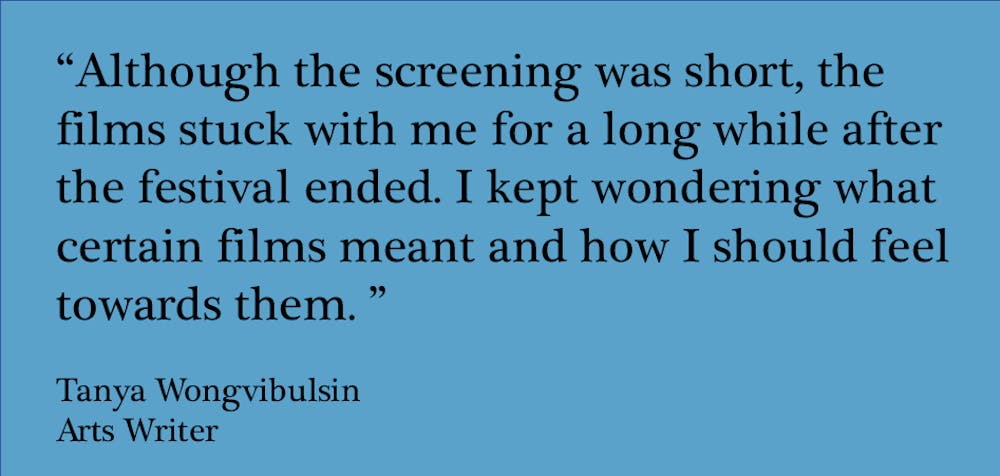Last week, I attended a screening of short films at the 21st Hopkins Film Festival. Its overarching theme was prom, and it took place at the JHU-Mica Film Centre. Not knowing what to expect before the screening, I was surprised at how many different emotions the films provoked.
My favorite short film was The Night Fish by Albert Birney. It showed the psychedelic adventure of a character trying to get away from a night fish, a creature that visits daily. Narrated in French, the film introduced many different bizarre characters, sometimes making it unclear what their purpose was. Some examples included a fly that farts and poops and an elephant that tries to balance itself on a pin.
I walked out of the theater with the biggest impression from The Night Fish because it was outlandish yet comical. The fact that Birney never clarified what the night fish truly represented also kept me wondering what the character could possibly be and how I could connect it to my own life.
The film that made me feel most uncomfortable and confused definitely had to be S’ghetti Eddie by Matisse Rifai. The dialogue-less film was about a shirtless teenage boy (who was covered in dirt) eating spaghetti while smoking a cigarette. The loud chewing noise in the background as well as the way the character switched between smoking and shoving a pile of spaghetti into his mouth made me feel alarmed. I had to close my eyes and take a deep breath at a certain point.
The film ended after the boy finished both his cigarette, which he ended up eating, and the pile of spaghetti in front of him. I didn’t understand the purpose of the film (perhaps it was supposed to deliberately create discomfort) or why it was chosen out of around 500 submitted films to be shown at the festival.
The last film screened was Yorick, a film by Lydia Milano who is currently a senior at Hopkins. Yorick depicts the simple life and aspirations of a strange puppet with wired eye lashes. In the setting of his home, Yorick was filmed doing simple tasks such as eating, dancing and dreaming alone. It was a heartfelt film that made me reflect upon my own dreams and simple life routines.
At the end of the screening, I had the chance to talk to Milano and clear up questions I had about the film. She discussed what she wanted to accomplish with the film.
“I just kind of want people to sympathize with the puppet in a way, even though he is kind of a strange character and he doesn’t speak at all and he’s just a puppet,” Milano said. “But I hope that people feel a little sad for him, but that they realize that he’s sweet and that he has his own sorts of dream and aspirations.”
When asked to talk about her inspiration, Milano commented on her professor and the films that she watched during her studies.
“The biggest inspiration was probably my professor, Karen Yasinsky, because that’s the style of puppet animation she does,” Milano said. “But then I like other animation styles. I was really influenced by Wallace and Gromit. And also, the character came out of some stuff I watched for class, like early German Expressionist films.”
Senior Gillian Waldo, co-director of the Hopkins Film Society, addressed how the films were chosen and what the overall mission of the festival was.
“We’re not super interested in narrative films, so that kind of took some out of the running immediately,” Waldo said. “And I think we agreed that all of these were playing with some sort of really specific aesthetic quality and kind of pushing that... They’re all in different mediums but definitely pushing the envelope in terms of their structure and presentation.”
Waldo commented on the goals the festival hoped to achieve.
“We just want to contribute to the film scene here and put on events that bring in both Johns Hopkins students and the Baltimore community at large. We tried to program pretty diverse offerings,” she said.
Although the screening was short, the films stuck with me for a long while after the festival ended. I kept wondering what certain films meant and how I should feel towards them. Overall, I think that the films’ aesthetic qualities and content are what made them unique. Although they were a bit too quirky for my taste, I could definitely see some people enjoying these thought-provoking films.





